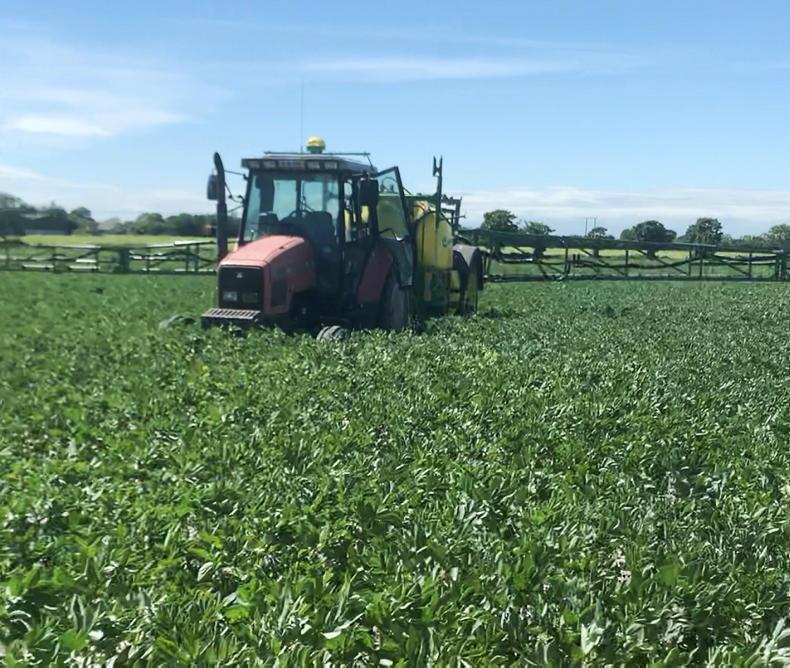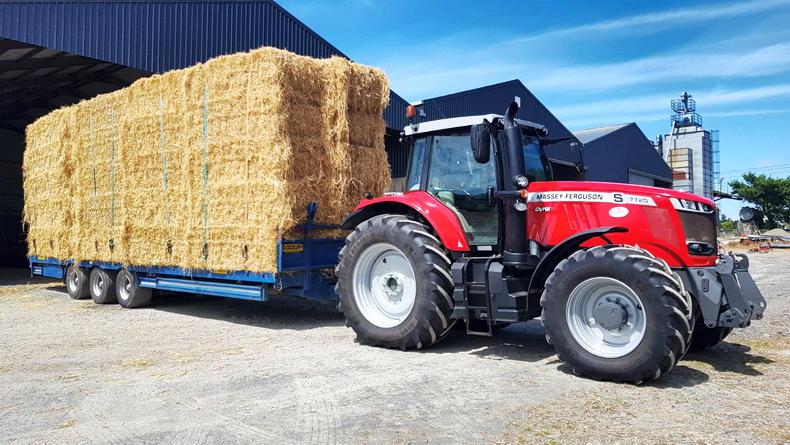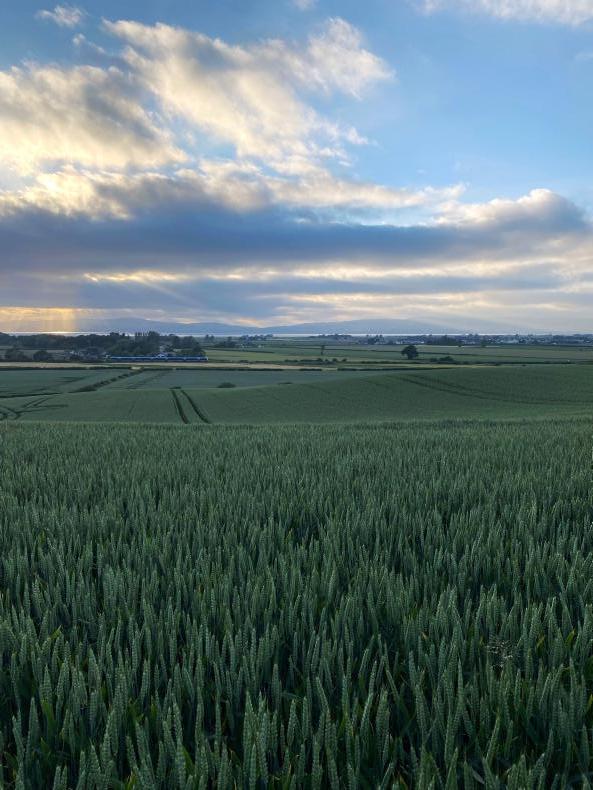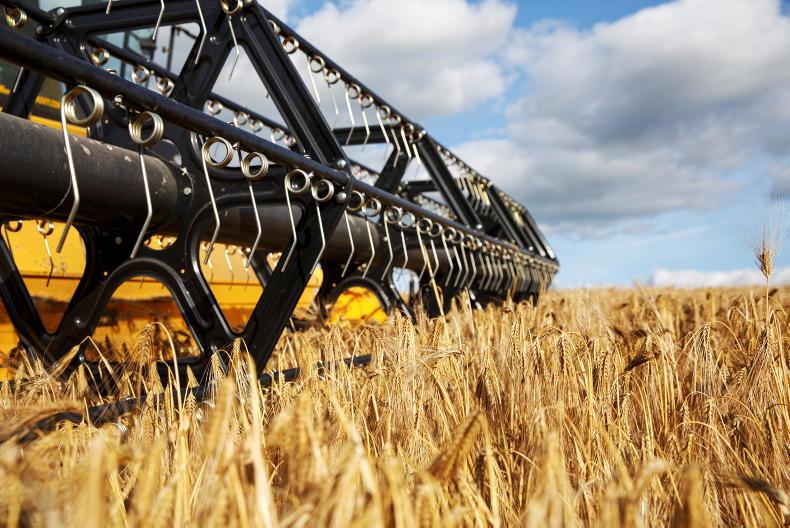Norman Dunne –
Kilgraigue,
Co Meath
The past few weeks have been busy on Norman’s farm in Meath, but now the gates are most likely closed on all crops.
Earlier this week, Norman was busy making hay with all the trials and tribulations that task involves as well as the challenge of trying to fit the job in with the weather. He has also made some hay in recent weeks.
Norman is very pleased with the condition and appearance of his crops.

Norman applying Signum onto his spring beans a couple of weeks ago
He reminded me that he had set himself a target of five years to get his land and output level back to where it had been prior to changing the ethos of his farming system. And if this year’s crops deliver as they look currently, he may well hit that target this year. However, he acknowledges that the weather has been relatively kind despite the dry and cold start and that it will account for part of the performance.
Since last featured, Norman applied the final sprays to all crops. He is happy with the spring beans, which look clean and healthy, and the pods are reasonably high off the ground for harvest. Signum (0.75kg/ha) was applied at early flowering and Norman intends this to be the only fungicide applied. Also in that tank mix were 10kg of magnesium sulphate, 1l of phosphite, 25kg of sulphate of potash, 2l of seaweed extract, 2l of humic acid, 4l of molasses and 0.4l of Nutrism.
The spring barley received its final treatment at awns emerging
His spring wheat was sprayed with Revystar (1.0l/ha) at flag leaf emerged stage. This spray also applied 6kg/ha of magnesium sulphate, 1l of seaweed extract, 1l of humic acid, 1l of phosphite and 0.4l of Nutrism.
Norman’s winter wheat received a head spray of Prosaro (0.8l/ha) plus Az-Tec (0.4l/ha), along with 1l of seaweed extract.
The spring barley received its final treatment at awns emerging. This was a fungicidal mix of Trinity (0.4l/ha) plus Ceratavo (0.4l/ha), along with 1l of seaweed extract, 1l of humic acid, 2l of molasses, 7 units of nitrogen (dissolved urea), 6kg of magnesium sulphate and 0.4l of Nutrism. He may yet apply a little additional phosphate to the spring barley.
John Crowley –
Mallow,
Co Cork
Conditions are dry in Mallow, explains John. Around 18mm of rain fell on his farm during the month of June.
While some more rain would be of benefit to his spring beans, spring barley and winter wheat, he’s not under pressure just yet. He says that daytime temperatures haven’t been very high and there has been plenty of cloud cover, which has helped prevent moisture-stress in crops.

John sold the last of his 2020 straw this week.
It’s a quiet time on John’s farm, as spraying programmes have now largely wrapped up. He serviced his New Holland 8070 combine last week and is currently working on his square baler. John says that parts are proving a challenge to secure this year and questions if the Covid-19 pandemic has something to do with it.
He thinks his winter barley harvest will commence around 20 July this year. This will be later for him, as on average, his harvest normally commences around 13 July.
His winter barley crops are looking well, but John thinks the harvest could clash with winter oats this year. His winter oat crops are looking good and he thinks they’ll be ripe slightly earlier than normal.
John’s winter wheat crops are looking very good. He says it’s been a low disease pressure year for all crops and this remains the case. He adjusted his fungicide programme throughout the season accordingly. On 12 June, the crop received a head spray of Prosaro (1l/ha).
Elsewhere, John is down to his final few loads of 2020 grain, which are currently being delivered
The headlands on his spring barley crops are thin after coming through the difficult spring. However, the majority of his crops are looking good. All spring barley crops received a head spray of Venture Extra (0.65l/ha), as well as Priaxor (0.65l/ha) last week.
His spring beans received an application of Signum (0.7kg/ha) two weeks ago. He also added a boron trace element spray into the tank.
Elsewhere, John is down to his final few loads of 2020 grain, which are currently being delivered. He also delivered his last load of 2020 straw this week.
Jonathan Kelly –
Limavady,
Co Derry
When talking to Jonathan this week, he was in the middle of preparing his yard for the delivery of a new weighbridge. He says having his own weighbridge is vital to understand how each field performs in terms of grain, silage and wholecrop production.
The weather has been good in Limavady. Temperatures have really increased over the past couple of weeks, which has had a marked impact on crops, particularly maize. Around 21mm of rain fell on his farm last Thursday, which was welcome.

Jonathans winter wheat is looking very promising this year
He thinks his winter barley harvest could be later than normal, but reckons this won’t do the crops any harm. The crops are looking very good and he believes they have great potential this year.
Jonathan’s winter hybrid rye is looking excellent, however he thinks rust may have crept into one crop. The best of his rye crops stand at around 1.8m in height. He thinks the harvest will fall around 18 July.
He remains very happy with his winter wheat crops, which are due a T3 fungicide of Cello (0.75l/ha) this week. His winter oilseed rape crops are thick, but have leaned over, which may make harvesting a challenge.
His spring barley crops have raced through the growth stages, but are looking good
Jonathan’s maize crops have developed rapidly over the last two weeks, thanks to an increase in temperatures. The crop needed a herbicide application two weeks ago of Accent (50g/ha) and Callisto (1l/ha) in order to take out chickweed and nettles.
He is trialling liquid nitrogen on his maize crops this year. Last week, he applied 12.5/ha of 23% liquid nitrogen as well as a trace element spray to the crop.
His spring barley crops have raced through the growth stages, but are looking good. On 14 June, the crops received a T1 of Fandango (1l/ha) as well as Medax Max (0.3kg/ha), along with EPSO Combitop (5kg/ha). The crops are due their T2 this week.
Finally, his spring beans are developing well and last week’s rain has been beneficial for them.
Norman Dunne –
Kilgraigue,
Co Meath
The past few weeks have been busy on Norman’s farm in Meath, but now the gates are most likely closed on all crops.
Earlier this week, Norman was busy making hay with all the trials and tribulations that task involves as well as the challenge of trying to fit the job in with the weather. He has also made some hay in recent weeks.
Norman is very pleased with the condition and appearance of his crops.

Norman applying Signum onto his spring beans a couple of weeks ago
He reminded me that he had set himself a target of five years to get his land and output level back to where it had been prior to changing the ethos of his farming system. And if this year’s crops deliver as they look currently, he may well hit that target this year. However, he acknowledges that the weather has been relatively kind despite the dry and cold start and that it will account for part of the performance.
Since last featured, Norman applied the final sprays to all crops. He is happy with the spring beans, which look clean and healthy, and the pods are reasonably high off the ground for harvest. Signum (0.75kg/ha) was applied at early flowering and Norman intends this to be the only fungicide applied. Also in that tank mix were 10kg of magnesium sulphate, 1l of phosphite, 25kg of sulphate of potash, 2l of seaweed extract, 2l of humic acid, 4l of molasses and 0.4l of Nutrism.
The spring barley received its final treatment at awns emerging
His spring wheat was sprayed with Revystar (1.0l/ha) at flag leaf emerged stage. This spray also applied 6kg/ha of magnesium sulphate, 1l of seaweed extract, 1l of humic acid, 1l of phosphite and 0.4l of Nutrism.
Norman’s winter wheat received a head spray of Prosaro (0.8l/ha) plus Az-Tec (0.4l/ha), along with 1l of seaweed extract.
The spring barley received its final treatment at awns emerging. This was a fungicidal mix of Trinity (0.4l/ha) plus Ceratavo (0.4l/ha), along with 1l of seaweed extract, 1l of humic acid, 2l of molasses, 7 units of nitrogen (dissolved urea), 6kg of magnesium sulphate and 0.4l of Nutrism. He may yet apply a little additional phosphate to the spring barley.
John Crowley –
Mallow,
Co Cork
Conditions are dry in Mallow, explains John. Around 18mm of rain fell on his farm during the month of June.
While some more rain would be of benefit to his spring beans, spring barley and winter wheat, he’s not under pressure just yet. He says that daytime temperatures haven’t been very high and there has been plenty of cloud cover, which has helped prevent moisture-stress in crops.

John sold the last of his 2020 straw this week.
It’s a quiet time on John’s farm, as spraying programmes have now largely wrapped up. He serviced his New Holland 8070 combine last week and is currently working on his square baler. John says that parts are proving a challenge to secure this year and questions if the Covid-19 pandemic has something to do with it.
He thinks his winter barley harvest will commence around 20 July this year. This will be later for him, as on average, his harvest normally commences around 13 July.
His winter barley crops are looking well, but John thinks the harvest could clash with winter oats this year. His winter oat crops are looking good and he thinks they’ll be ripe slightly earlier than normal.
John’s winter wheat crops are looking very good. He says it’s been a low disease pressure year for all crops and this remains the case. He adjusted his fungicide programme throughout the season accordingly. On 12 June, the crop received a head spray of Prosaro (1l/ha).
Elsewhere, John is down to his final few loads of 2020 grain, which are currently being delivered
The headlands on his spring barley crops are thin after coming through the difficult spring. However, the majority of his crops are looking good. All spring barley crops received a head spray of Venture Extra (0.65l/ha), as well as Priaxor (0.65l/ha) last week.
His spring beans received an application of Signum (0.7kg/ha) two weeks ago. He also added a boron trace element spray into the tank.
Elsewhere, John is down to his final few loads of 2020 grain, which are currently being delivered. He also delivered his last load of 2020 straw this week.
Jonathan Kelly –
Limavady,
Co Derry
When talking to Jonathan this week, he was in the middle of preparing his yard for the delivery of a new weighbridge. He says having his own weighbridge is vital to understand how each field performs in terms of grain, silage and wholecrop production.
The weather has been good in Limavady. Temperatures have really increased over the past couple of weeks, which has had a marked impact on crops, particularly maize. Around 21mm of rain fell on his farm last Thursday, which was welcome.

Jonathans winter wheat is looking very promising this year
He thinks his winter barley harvest could be later than normal, but reckons this won’t do the crops any harm. The crops are looking very good and he believes they have great potential this year.
Jonathan’s winter hybrid rye is looking excellent, however he thinks rust may have crept into one crop. The best of his rye crops stand at around 1.8m in height. He thinks the harvest will fall around 18 July.
He remains very happy with his winter wheat crops, which are due a T3 fungicide of Cello (0.75l/ha) this week. His winter oilseed rape crops are thick, but have leaned over, which may make harvesting a challenge.
His spring barley crops have raced through the growth stages, but are looking good
Jonathan’s maize crops have developed rapidly over the last two weeks, thanks to an increase in temperatures. The crop needed a herbicide application two weeks ago of Accent (50g/ha) and Callisto (1l/ha) in order to take out chickweed and nettles.
He is trialling liquid nitrogen on his maize crops this year. Last week, he applied 12.5/ha of 23% liquid nitrogen as well as a trace element spray to the crop.
His spring barley crops have raced through the growth stages, but are looking good. On 14 June, the crops received a T1 of Fandango (1l/ha) as well as Medax Max (0.3kg/ha), along with EPSO Combitop (5kg/ha). The crops are due their T2 this week.
Finally, his spring beans are developing well and last week’s rain has been beneficial for them.









 This is a subscriber-only article
This is a subscriber-only article










SHARING OPTIONS: